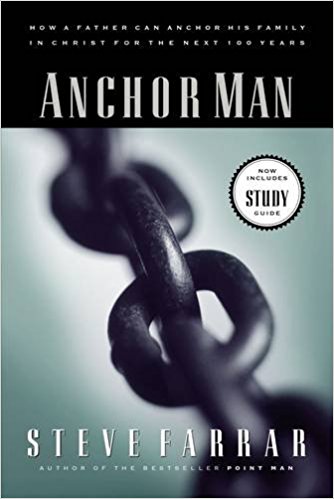Click here to return to Blog Post Intro

As Farrar notes in Anchor Man, “God expects each father to anchor his family for at least 100 years. Spiritual Capital builds with ‘compound interest’. It is the result of obedience—you put some away every day, every week, every month. Like most investments, it builds slowly…”
My dad leads with a Quiet Strength, and he is more comfortable working with his hands and serving behind the scenes than delivering a speech or writing a blog…but that doesn’t mean Dad wasn’t a teacher. Dad’s life spoke to me in a variety of ways. Now, after 45 years of being his son and 17 years of being a father myself, here are a few observations.
What Dad Taught Me: 5 Principles I Practice as a Father
1. Family (and Extended Family) Relationships Matter
Growing up, it was a priority for our family to spend time with our grandparents and our great-grandparents. Several times a year, we’d travel an hour from Corpus Christi to our great-grandparents’ home in Alice, Texas and spend Sunday afternoons with them. Then, when my mom’s parents moved from our hometown to Wimberley, Texas, we would make regular trips there to see them. I learned early in life the importance of making family relationships a priority. I’ve noted often in my blog that a big part of my own family’s mission is that “our immediate and extended family relationships are important to us.”
2. Work is a Means to Provide for Family
Farrar points out that the enemy loves to take Christian fathers and get their careers out of balance. As men, we were created to work, and many of us love what we do. That can lead us to spend more and more time at work and away from family. Farrar goes on to note, “Distraction always creates distance; distance is toxic to Christian fathers. Physical distance from your children is even more toxic.” Farrar points to 1 Timothy 5:8 and says, “Our work is not to distract us from our children, our work is to provide for our children.”
From his time as a carpenter to work as an Army helicopter mechanic, Dad modeled what it looked like to get up every day, whether he liked it or not, and go to work for the family. Dad always worked hard. That’s one of the reasons I pursued an education. I always wanted a desk job, where I could wear a tie to work! Dad’s jobs were physically demanding and required significant focus and discipline, but Dad never wavered in his commitment to provide for us.
At the same time, Dad was always there for us. He never missed our practices, games, or school events because of work commitments. He prioritized time with us over making more money or climbing any kind of career ladder. After leaving home and watching Dad’s career from afar, I saw how those sacrifices hurt his career. If he had been more career-minded when his boys were young, he would have progressed faster at work…but that’s not what an Anchor Man does!
3. Discipline Your Children, so They Fear the Lord
In Deuteronomy 6, fathers are instructed to teach their children to fear the Lord. Farrar says, “There is a narrow difference between acceptable, healthy ‘awe’ and destructive fear. A child should have a general apprehension about the consequences of defying his parents. By contrast, he should not lie awake at night worrying about parental harshness or hostility.”
Farrar outlines 10 principles of effective discipline:
(1) Start early in disciplining your children;
(2) Use discipline for training, not humiliation or venting of anger;
(3) Deal swiftly with disrespect;
(4) Discipline rebellion and defiance, not childish mistakes;
(5) Communicate the rule clearly, and enforce it the first time;
(6) Make sure your child understands why he is being disciplined;
(7) Don’t be afraid to make midcourse corrections or admit when you have been wrong;
(8) Husbands and wives must present a united front to the children;
(9) Always discipline with your child’s personality in mind; and
(10) Make sure the punishment fits the crime.
Dad was an effective disciplinarian. I knew that he loved me and wanted what was best for me. He provided the right kind of boundaries in our home and encouraged us to treat Mom and our elders with respect. Farrar notes, “Children will copy the original atmosphere you set in the home. Children will copy your original attitude toward their mother. Children will copy your approachability. What makes a father approachable? He listens and he understands.”
Leaving home, I had to be broken of the habit of saying, “Yes ma’am” and “No ma’am” to my forty-something year-old bosses! Now, I’m in the position of discouraging some of our young employees from doing the same thing…but that’s a good habit to have to break!
4. Practice Proverbs 22:6
Chuck Swindoll explains, “Adapt the training of your child so that it is in keeping with his God-given characteristics and tendencies; when he comes to maturity, he will not depart from the training he has received.” When a child understands his strengths and is encouraged in them, he will be fulfilled.
Dad has the Spiritual Gift of Exhortation (or Encouragement). I have come to appreciate that even more lately. Every Friday night, Tanner (our 10 year-old) has batting practice. In the batting cage next to us is a father who was a talented baseball player of his own, throwing batting practice to his 9 year-old son. For the entire hour we’re there, he is constantly berating and belittling his son. Dad never did that to either my brother or me; and we both loved and excelled in sports as a result of his quiet, steady encouragement. Dad expected effort, excellence, and hard work, but he knew how to motivate us toward those ends.
Additionally, Dad took us to church every Sunday. It was just what we did…no matter what was going on that week, how tired Dad was, or what else was going on, we were in church. For a son, this is critical modeling. Kids need to see their fathers faithfully leading them to church every week. This tells the family that worship of Jesus Christ matters so much so that we voluntarily set aside a day each week in worship. It’s practicing the Sabbath principle. Over the years, I watched as Dad gave himself, his time, his money and his talents to the work of the Kingdom. I want my kids to see the same example from me.
5. Let Your Life Be A Witness to Jesus Christ
On April 28, my parents celebrated their 50th wedding anniversary! What I’ve seen from Dad is, through all the challenges of life, the value of simple, everyday faithfulness. Not all of life is easy. Dad’s faithfulness to Mom shows that an Anchor Man perseveres.
In everything he does, Dad takes pride in his work and performs with Excellence. I remember a sign in his cabinet shop that said, “If you haven’t got the time to do it right, when will you find the time to do it over?” At work, he provided quality products and services. At home and in his neighborhood, Dad does things right…even if no one else sees it.
The work we do with our hands reflects the Creator. When He gives us a job to do, we should do it well—to His glory. Dad’s work serves as his witness to a watching world.
Final Words
James Dobson’s father wrote him a letter that said, “I have observed that the greatest delusion is to suppose that our children will be devout Christians simply because their parents have been, or that any of them will enter into the Christian faith in any other way than through their parents’ deep trevail of prayer and faith.”
The Bible encourages us to consider a multi-generational vision for God’s kingdom. As fathers faithfully turn their hearts toward their children and the children respond in kind, the next generation will build upon the faith and improve upon the faithfulness of their parents.
Unfortunately, too many people in our day and age don’t know the treasure of a great father. I’m grateful, by God’s grace, that I do. In fact, my father is one of my heroes because he showed me what it looks like for a Christian man to live out his faith in the nitty-gritty, daily grind of life, and my prayer is that my kids will be able to say the same of me.




